Essayer OR - Gratuit
Safeguard Against Biting
Horse and Rider
|Summer 2021
PROBLEM SOLVED

Biting can quickly become dangerous. Learn how to counteract this behavior and turn it into a relationship-building opportunity.
As you go to saddle your horse, he reaches around with his muzzle. Just when you think he’s curious and looking to see what you’re doing, you turn your body away and feel his teeth sink into your arm. You know your horse isn’t experiencing any pain, and it didn’t appear that your horse was being aggressive toward you, so why did he bite?
Here I’ll explain why your horse is nipping at you, and then show you how you can prevent biting and build a better relationship with your horse in the process.
Why Is He Mouthy?
Often when your horse is mouthy or tries to bite, he isn’t aiming to hurt you. He’s actually trying to engage with you. If you watch your horse in the pasture with his playmates, you’ll notice that he may interact with other horses by using his mouth. This is because when a horse is curious and wants to engage with something, he usually does so with his mouth and lips to investigate and as if to say, “Hey, pay attention to me.”
If you’re not paying attention and your horse is trying to engage with you, he may start to nibble at you to get your focus back on him. At this point, his biting isn’t mean or meant to be aggressive, but it can turn into a dangerous habit if you don’t address the problem immediately and try to fix this behavior.
1. Engage with Your Horse
Cette histoire est tirée de l'édition Summer 2021 de Horse and Rider.
Abonnez-vous à Magzter GOLD pour accéder à des milliers d'histoires premium sélectionnées et à plus de 9 000 magazines et journaux.
Déjà abonné ? Se connecter
PLUS D'HISTOIRES DE Horse and Rider
Horse and Rider
Ranch Sorting Drills For a Dull Horse
Some horses are born eager to hunt a cow, while others—no matter how broke—would rather conserve energy and hang back. A horse that's dull to your leg or slow to react can make working a cow frustrating and unproductive. The goal isn't just to get through the run—it's to teach your horse to drive up into a cow with purpose and maintain forward momentum without constant kicking or nagging from you.
3 mins
Winter 2025
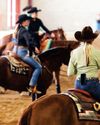
Horse and Rider
Foundation Focus
To boost confidence, Eric Priest takes the horse and rider back to the basics.
3 mins
Winter 2025

Horse and Rider
Old Habits Die Hard
Learn now traditions in the horse woria may not simply be outdated but can actually be harmful to your horse's health.
8 mins
Winter 2025
Horse and Rider
No Trainer? No Problem.
Four do-it-yourself non-pros share how they balance work, budgets, and barn time—and still find success in the show pen.
8 mins
Winter 2025
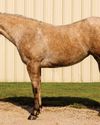
Horse and Rider
2-Year-Old Quarter Horse Mares
Evaluate and place these 2-year-old reining mares. Then see how your choices compare to our expert judge's.
3 mins
Winter 2025
Horse and Rider
Rehabbing a Foundered Horse
Founder can feel like a four-letter word for horse owners, and it's one of the toughest conditions to try to rehab a horse from. Laminitis, the medical name for founder, occurs when blood flow to the laminae is disrupted, weakening the bond inside the hoof. If left untreated, there can be rotation or sinking of the coffin bone. This is typically when it's referred to as founder, and when riders begin to worry that their horse is either permanently unrideable or will be in too much pain to continue living.
2 mins
Winter 2025
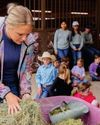
Horse and Rider
Winter Fun With Horses
When the weather keeps your child out of the saddle, here are tips to keep their interest and knowledge growing.
2 mins
Winter 2025
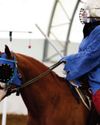
Horse and Rider
Making 'Magic' Happen
A terrible situation led to one woman finding the magical bond she'd been seeking.
5 mins
Winter 2025
Horse and Rider
Against the Odds
RIGHT BEFORE THIS ISSUE WENT TO PRESS, I had the opportunity to go to the Snaffle Bit Futurity finals and watch some of the top 3-year-old cow horses in the world compete for the prestigious title of Snaffle Bit champion. As I watched John Swales complete his fence work run, I couldn't help but tear up. John wasn't just on any horse—he was riding Bowie Nights, a horse trained by his sister, Veronica Swales. Veronica was involved in a serious accident at the National Stock Horse Show back in August and is currently unable to compete, but she knew that if anyone could step in and show her horses to their full potential, it was her brother.
2 mins
Winter 2025
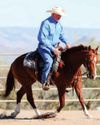
Horse and Rider
Small Arena Hacks
When weather doesn't cooperate, don't let a small indoor arena stunt your growth.
2 mins
Winter 2025
Translate
Change font size
